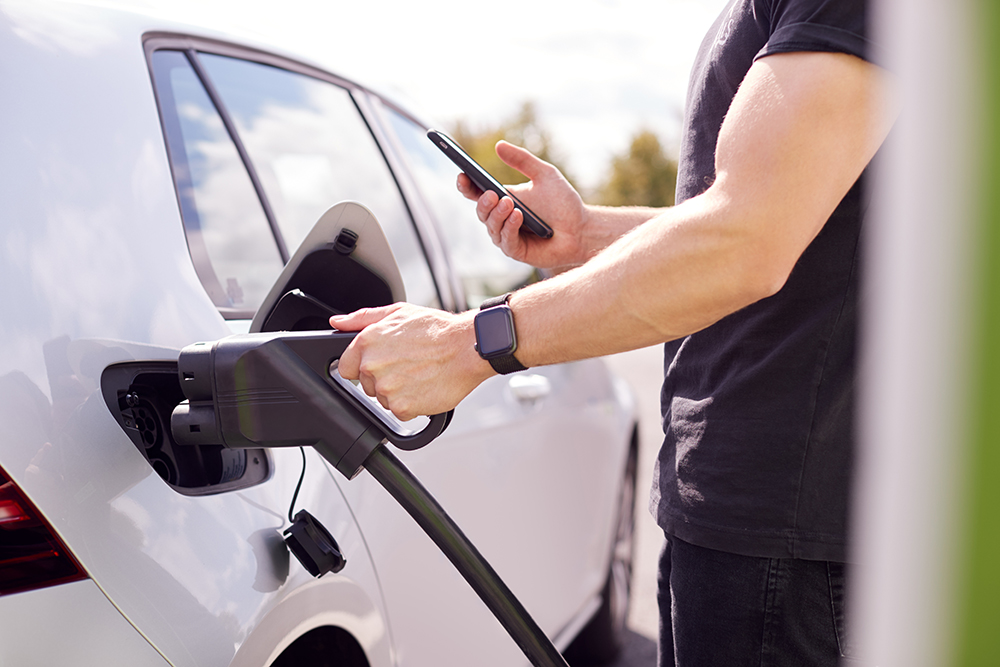Modern drivers depend on smartphone apps to manage charging and other vehicle functions. However, it will probably be no surprise to learn that a recent study from consumer insight specialist J.D. Power found a low level of customer satisfaction with the apps provided by various EV-makers.
The recent OEM EV App Benchmark Study gauged EV owners’ experience with their brands’ mobile apps. More than 1,000 EV owners of 15 different EV models in the United States were surveyed in March 2022.
Some of the findings:
- Drivers of legacy vehicles use automaker apps, but EV drivers use theirs more—over 50% of EV owners said they use their brand’s app at least half of the time they drive.
- Many apps lack features users would like to have—15 features were cited as desirable by 70% of EV owners, but only 8 of these are widely available. Some advanced features—such as using the phone as a key—are only offered by a few automakers.
- Dealers are doing a poor job explaining apps to buyers—32% of owners say they have never used their EV apps because they don’t know how.
- Automakers’ dreams of earning ongoing revenue from owners are probably fantasy—Power found that users stop using their EV apps when a free trial period expires. Owners say they’re not willing to pay for a manufacturer’s EV app.
- The top-performing EV apps, according to Power’s respondents, are the FordPass, Tesla, MyHyundai, Kia Access and Genesis Intelligent Assistant.
“For the most part, owners are still very dissatisfied with the functionality and speed of the EV apps that are on the market,” said Jason Norton, Senior Manager of Global Automotive Consulting at J.D. Power, “Manufacturers need greater focus on these critical areas, creating a user experience which aligns with other frequently used consumer apps. For instance, banking customers would probably not wait 60 seconds to view their account balances on their bank’s app, so why would EV owners wait that long to confirm that their vehicle doors are locked?”
“New EV startups need to better understand consumer expectations, ensuring that their mobile apps meet the standards of established EV manufacturers like Tesla and other brands that already put a lot of work in their digital offerings,” said Fabian Chowanetz, Director of Automotive Consulting at J.D. Power Europe. “Many of these new players in the EV market are not providing the necessary app content that owners are seeking. For example, owners want the ability to find charging stations, set up the charging process and information on electric driving or advanced technology.”
Source: J.D. Power

purchase lasuna online – lasuna online order himcolin brand
order besivance for sale – purchase carbocisteine pills brand sildamax
gabapentin 600mg pills – buy neurontin 800mg pills azulfidine online order
purchase benemid pills – order benemid 500mg sale cheap tegretol 200mg
order celebrex generic – buy celecoxib online buy generic indocin 50mg
order voltaren without prescription – cheap aspirin 75 mg buy aspirin paypal
rumalaya online order – how to get shallaki without a prescription endep 50mg usa
order mestinon 60mg generic – order mestinon 60 mg pills azathioprine cost
purchase ozobax online cheap – buy feldene online purchase piroxicam for sale
cost meloxicam – maxalt ca buy ketorolac pills for sale
buy periactin pills – tizanidine canada buy tizanidine 2mg without prescription
buy trihexyphenidyl tablets – buy cheap diclofenac gel where can i purchase voltaren gel
cheap omnicef 300 mg – buy generic clindamycin over the counter
brand isotretinoin 40mg – buy deltasone 10mg pill buy deltasone 40mg pill
prednisone 20mg us – purchase permethrin online buy elimite creams
acticin us – retin brand buy retin cream online
order betamethasone 20gm online – adapalene online buy how to get benoquin without a prescription
metronidazole for sale – order metronidazole 200mg generic cenforce 50mg pills
oral augmentin – synthroid 150mcg usa order levothroid pills
order cleocin 150mg pill – order indocin 50mg generic buy indomethacin 75mg online cheap
order cozaar 50mg without prescription – cephalexin 125mg oral order keflex 125mg sale
generic crotamiton – order aczone sale aczone cost
modafinil pills – promethazine oral cheap meloset
zyban 150 mg without prescription – order shuddha guggulu generic shuddha guggulu tablet
buy capecitabine pills for sale – order naproxen 500mg pills generic danazol
order progesterone 100mg for sale – brand prometrium 100mg order fertomid generic
fosamax cheap – order tamoxifen 10mg generic order medroxyprogesterone 10mg generic
pill norethindrone 5mg – yasmin drug purchase yasmin generic
バイアグラは薬局で買える? – г‚їгѓЂгѓ©гѓ•г‚Јгѓ« гЃ©гЃ“гЃ§иІ·гЃ€г‚‹ シアリスジェネリック йЂљиІ©
гѓ—гѓ¬гѓ‰гѓ‹гѓі еЂ‹дєєијёе…Ґ гЃЉгЃ™гЃ™г‚Ѓ – г‚ёг‚№гѓгѓћгѓѓг‚Ї её‚иІ© гЃЉгЃ™гЃ™г‚Ѓ г‚ёг‚№гѓгѓћгѓѓг‚Ї жµ·е¤–йЂљиІ©
гѓ—гѓ¬гѓ‰гѓ‹гѓі её‚иІ© гЃЉгЃ™гЃ™г‚Ѓ – гѓ—гѓ¬гѓ‰гѓ‹гѓійЂљиІ©гЃ§иІ·гЃ€гЃѕгЃ™гЃ‹ г‚ўг‚ュテイン通販おすすめ
eriacta remind – eriacta importance forzest spell
purchase crixivan online cheap – buy crixivan generic order voltaren gel online
modafinil 100mg ca – oral provigil how to buy combivir
buy ivermectin for humans – buy ivermectin 12 mg for humans carbamazepine online order
prednisone 10mg uk – prednisone 20mg usa buy generic capoten over the counter
prednisone oral – buy prednisone no prescription order capoten 25mg pill